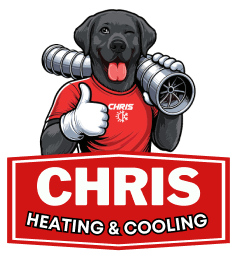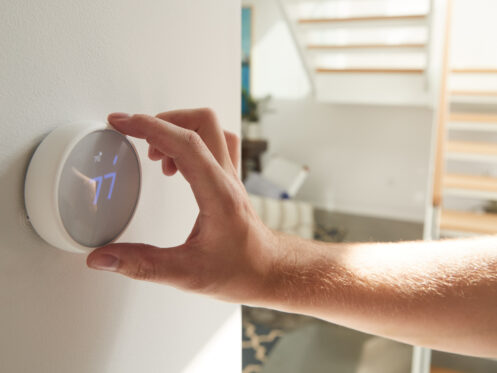Poor indoor air quality can be a big problem for homeowners in West Chicago and the surrounding areas. It can cause a home to smell unpleasant and not be as comfortable as you’d like. Indoor air pollution can also have a significant impact on your health. Short-term effects can include respiratory irritation, restless sleep, fatigue, and headaches. Household members with allergies and asthma may experience more intense symptoms. There can be long-term health implications as well. Let’s explore what trusted HVAC pros have to say about achieving and maintaining optimal indoor air quality.
Indoor Air Quality Testing
Many HVAC experts recommend professional indoor air quality testing once every two years. A comprehensive test will reveal your home’s air quality challenges. Regular testing is necessary because the presence of airborne pollutants and contaminants can change over time. Consider radon, which is the leading cause of lung cancer among non-smokers in the U.S. It can appear suddenly and seep up into your home from the ground.
Testing will reveal household allergens, such as dust, dust mites, pollen, and mold. It will also reveal the fine particles that can lead to cardiovascular and respiratory diseases over time. Our team can also identify gases and chemicals, such as carbon monoxide (CO) and volatile organic compounds (VOCs). We can find dangers like asbestos and lead too. We’ll tell you how concentrated these elements are and help you find the optimal solutions moving forward.
HVAC Filter
HVAC filters are often the easiest and fastest way to improve indoor air quality. Use a high-quality filter with the highest minimum efficiency reporting value (MERV) your system allows. MERV indicates a filter’s ability to trap particulate matter. At MERV 13, which many modern systems support, the filter will trap at least 90% of household allergens. It will also help to keep your HVAC equipment cleaner and, if applicable, dust and other debris out of your ducts.
The filter location in central systems is the supply vent or furnace. Check that filter every month and swap it out as needed. That will usually be when you see dust caking up or hear a whistling sound. Ductless systems have a filter located within each indoor unit. Check those filters every two weeks. Wash them as required and replace them annually.
Seasonal HVAC Tune-Ups
HVAC experts recommend scheduling a cooling tune-up for the beginning of spring and a heating tune-up for the start of fall. It’s good advice even if you have a unit that heats and cools, such as a heat pump. Tune-ups will lower operating costs, help avoid repairs, and extend equipment life.
Routine maintenance helps with air quality as well. Our technicians will remove all the dust and other grime that’s accumulated. That includes removing dirt and microbial growth from AC and heat pump evaporator coils. With fuel-fired appliances, we’ll clean the combustion equipment, check the exhaust, and ensure no dangerous backdraft scenarios exist.
Mechanical Ventilation
Modern homes often have tight building envelopes. This is fantastic from an energy-efficiency standpoint but has air quality implications. During the summer and winter, many homes get limited fresh air from their cooling and heating systems. That causes pollution to become more concentrated and dangerous.
An effective way to overcome this problem is with a dedicated mechanical filtration system. This equipment draws ample, filtered fresh air into a home. A ventilator won’t add allergens or other pollution but will lower concentration levels. It’s like having windows open but without a negative impact on your AC or heat. Some ventilators improve heating efficiency and offset the need for more advanced humidity control.
Whole-Home Air Purifiers
The best way to neutralize pollutants and contaminants in the home is through whole-house air purification. Our company offers in-duct air scrubbers that provide powerful air filtration without affecting the static air pressure of your HVAC system. We also have solutions available for homes that don’t already have ducts in place.
These air purifiers feature mechanical filtration using a high-quality pleated air filter. Some of these systems have a MERV filter, and those go as high as MERV 16. Others have a high-efficiency particulate air (HEPA) filter. HEPA filters trap at least 99.97% of all particles that pass through them.
Many of these systems pair an air filter with activated carbon. Activated carbon is a highly porous substance with substantial surface area. It can absorb unpleasant odors in the home. Activated carbon can also absorb smoke, fumes, gases, and volatile organic compounds, such as formaldehyde.
Whole-Home Dehumidifiers and Humidifiers
The optimal range for relative humidity (RH) in the home is 30% to 50%. Many households cannot achieve this range through heating and cooling alone. The solutions are humidifiers and dehumidifiers.
A dehumidifier removes moisture from the air and helps you keep RH at 50% or below in summer. It will make it much easier to breathe and your AC more effective. A low RH also eliminates the risk of mold and dust mites.
A humidifier adds water vapor to the air and helps you keep your RH up in winter. Dry air is an indoor air quality concern. It inflames your respiratory system and makes you more prone to infections and illnesses.
UV Lamps
Another way to help avoid illness year-round is through ultraviolet germicidal irradiation (UVGI). UVGI in the home is possible through an ultraviolet (UV) lamp we can install in your ducts. As bacteria and viruses pass through your ducts, the lamp will emit a light that neutralizes them. This light affects other microorganisms too, such as fungal spores and dust mite eggs.
Smart Thermostats
Programmable thermostats help you save money through scheduling. They can also help improve air quality by minimizing how often a system runs. Smart thermostats are programmable thermostats with Wi-Fi capabilities and other advanced features.
Some units support remote sensors. Having multiple temperature sensors throughout a home gives you greater accuracy. You can also add sensors for RH and other aspects of indoor air quality.
Zoned Control
Zoned control is an approach to central HVAC that organizes a home into discrete heating and cooling zones. It improves energy efficiency. Zoning also enhances air quality and lets you control ventilation, RH, and other aspects in those zones.
Ductless HVAC
Ductless HVAC is an alternative that offers higher energy efficiency and inherent zoning. Cool your home through a ductless air conditioner or variable refrigerant flow (VRF) system. An effective heating option that blows no air at all is a boiler. The system can deliver that heat using baseboard or wall radiators. Radiant floor heating is an option too.
Local Indoor Air Quality Experts in West Chicago
Chris Heating & Cooling is an HVAC company that’s served homeowners and businesses throughout West Chicago since 2005. Our HVAC team installs and services all makes and models of heating and cooling equipment and is available around the clock for emergency repairs. Our heating and cooling expertise extends to furnaces, heat pumps, air conditioners, zone control, boilers, radiant floors, and ductless systems. We also perform comprehensive indoor air quality testing. Our air quality experts can help you overcome challenges through ventilation, air purification, UVGI, humidity control, and smart thermostats. We also offer a maintenance plan that will keep your equipment serviced on schedule while saving you money. Contact us today with questions or to schedule an appointment.






